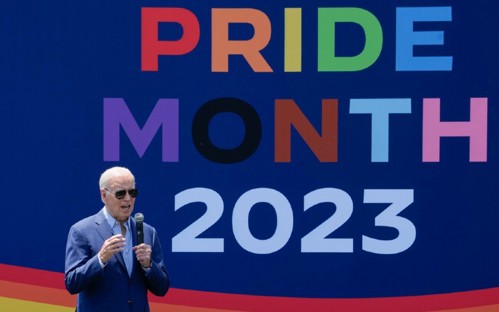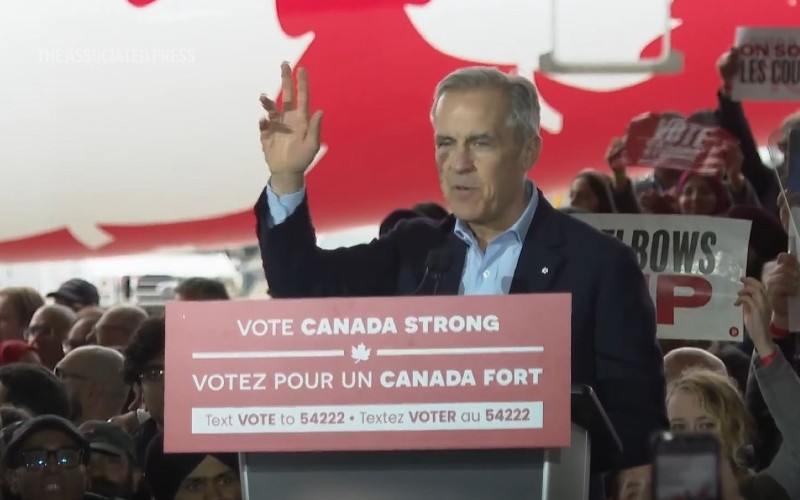President Donald Trump's executive order weakened disparate impact liability. That legal theory, first recognized under the Civil Rights Act of 1964, allows for protected classes to sue for discrimination even if the alleged violation appears like a neutral policy or decision.
The document he signed is entitled, "Restoring Equality of Opportunity and Meritocracy."
The EO follows Trump's pledge in his inauguration speech to promote a "society that is colorblind and merit-based."
 Much like the Trump administration closing a funding spigot for the Far Left when it shuttered USAID, Trump's executive order could stop the flow of corporate checks to radical left-wing groups.
Much like the Trump administration closing a funding spigot for the Far Left when it shuttered USAID, Trump's executive order could stop the flow of corporate checks to radical left-wing groups.
That is perhaps why Vox, the left-wing news outlet, called the EO a "blow" to civil rights law.
Will Hild, executive director of Consumers’ Research, calls the EO a win against government-endorsed coercion of left-wing ideas.
Much of the DEI ideology that has invaded corporations, Hild told the told the Washington Watch program, was actually driven by idealogues in the Biden administration.

“There were either threats of lawsuits against companies that didn't have a DEI department or weren't engaging in DEI, or government contracts that required DEI to be going on at the company in order to get federal funds," he advised.
Then came the Nov. 5 election last fall, when voters showed where they stood in Trump’s landslide victory over Vice President Kamala Harris.
 It now appears Corporate America, a longtime supporter of the LGBTQ movement, is starting to take notice, and now June could look a lot different.
It now appears Corporate America, a longtime supporter of the LGBTQ movement, is starting to take notice, and now June could look a lot different.
Trump’s EO could not and did not change Title VII in the Civil Rights Act. Instead, it means that when individuals bring disparate impact claims to court, the Equal Opportunity Commission is expected to largely step back from enforcing them.
Federal government policy is what executive orders can directly affect, but there could be a trickle down effect in the corporate sector, Hild told show host Jody Hice.
Rainbow groups lacking green
All of a sudden, major U.S. cities are lacking funds for "Pride" celebrations planned for June. That funding comes from major corporate sponsors that in the past have been bullied into writing a check to prove their support.
According to various media reports, San Francisco has lost the backing of Comcast, Anheuser-Busch, Diageo and Benefit Cosmetics. Those losses mean the city, famous for its homosexual activism, is short $200,000.
 “Will we be able to keep the doors open?” San Francisco Pride Executive Director Suzanne Ford said. “You know, that's what I'm most concerned about now.”
“Will we be able to keep the doors open?” San Francisco Pride Executive Director Suzanne Ford said. “You know, that's what I'm most concerned about now.”
St. Louis is down $150,000 after losing support from Anheuser-Busch.
In Washington, D.C., Booz Allen Hamilton, a federal contractor and previously committed sponsor for the Capital Pride Alliance, has withdrawn support.
CPA had been responsible for hosting the city’s World Pride event.
New York City has lost major sponsors like MasterCard, Citibank and PepsiCo.
There are several reasons for the turnabout, Hild says.
 “First of all, I think that they are increasingly seeing consumer fatigue with the constant shoving of the LGBTQ agenda down people's throats through the corporate sector,” he said.
“First of all, I think that they are increasingly seeing consumer fatigue with the constant shoving of the LGBTQ agenda down people's throats through the corporate sector,” he said.
Corporations are finding that the backlash from too many customers outweighs the praise and financial support – which is less than it once was, Hild says – from pro-LGBTQ groups.
“They don’t get as much credit as they used to get from the Left, and they’re getting an increasing amount of heat from people who just don't want these corporations to engage in politics at all. They find it nauseating,” Hild said.
 For years corporations bowed to the Environmental, Social, Governance (ESG) score, a metric used to evaluate a company’s performance in areas that would fall under each heading. Examples would include climate awareness, carbon footprint, diversity in hiring and promotions, and more.
For years corporations bowed to the Environmental, Social, Governance (ESG) score, a metric used to evaluate a company’s performance in areas that would fall under each heading. Examples would include climate awareness, carbon footprint, diversity in hiring and promotions, and more.
In theory, companies could be held accountable by lack of support from left-wing groups if they had a low ESG score.
“I think we're going to find out that a lot of this was actually being driven by government action, either direct subsidization through programs or enforcement of Civil Rights Act-type statutes that went after corporations if they weren't being seen as properly deferential to these advocacy groups,” Hild said.
Funds drying up for leftist groups
Some major LGBTQ support groups are also adjusting to new realities.
Human Rights Campaign, a Washington-based lobbying group, might be the best-known homosexual-rights group. It has laid off 20% of its workforce, approximately 50 employees, as part of a major restructuring effort.
 The layoffs began in February and have left HRC with roughly 180 staff members.
The layoffs began in February and have left HRC with roughly 180 staff members.
Additionally, GLSEN, a national nonprofit that promotes LGBTQ initiatives in schools, has laid off 60% of its workforce.
The loss of revenue at HRC and GLSEN, Hild says, suggests donations are down and their power has slipped.
"So I'm hopeful that this is a combination of consumer fatigue from what we've seen, a lot of that with the work that we've done, but also in ending to the subsidization and enforcement against companies that don't do it,” Hild said.







